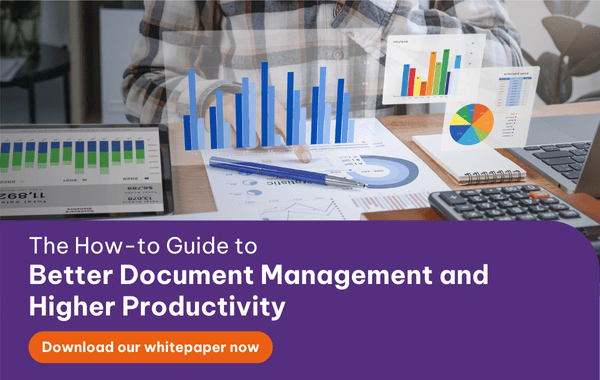Businesses across all industries have two things in common: they utilise documents and they create a lot of them. Documents are used for everything from sales reports to product development and end up being stored in all sorts of places, both digitally and physically.
Documents scattered over multiple platforms can be difficult to locate when the time comes for them to be used. Furthermore, they often end up being lost in the whirlpool of files, for example, as a result of being misfiled or simply mistakenly discarded.
All this facilitates a process that involves high costs, less efficiency and loss of important information.

But how do you manage these documents when you already have thousands, and you create hundreds each day? The answer is simply document management. There are different ways to do document management, for example, strict standard operating procedures and protocols. However, one of the most widespread, secure and efficient ways to solve the issue of document management, is through a Document Management System (DMS).
Read more: Get productive with these 7 tips for document management
What is a Document Management System (DMS)?
A DMS is a system designed to make storing, organising and sharing all your documents as easy as possible. It does this by giving your business a central hub for all your files, allowing all employees access to every necessary document they need without having to search email, desktop folders and separate drives.
At the same time, a DMS provides you with the ability to create metadata for all your files. This allows you to quickly and easily organise your files into the right categories, as well as allow for easy search for anything in the database.
Why a DMS?
Simple and clean storage
With a DMS, you can get rid of your physical filing cabinets, making more room in your office space or eliminating your digital mess. We all know the problem of having your documents saved in multiple places and having to figure out where that one critical file is when it is needed. At the same time, finding that one file in a company SharePoint where everyone has made a new folder for each file can be a time-consuming process.
With a DMS, everything can be neatly organised and given predetermined metadata so files are always saved in the correct places, without the risk of multiple employees making separate folders for the same files.
Most DMSs also include scanning functions which allow you to get your physical documents into the cloud.
Read more: Data Lake vs. Data Warehouse - What are the differences
Increase efficiency
According to a Mckinsey report, the average worker spends up to 20% of their workweek searching for information to do their tasks. By having a central hub with well-organised files, you allow your employees to do their work more efficiently by utilising the search functions in the DMS.
Minimise cost and the chance of document loss
Furthermore, according to facts presented on AIIM and repeated by many document management companies, the cost of simply filing a document can be up to $20, and this is increased to $220 if a document needs to be reproduced if lost or misfiled. These costs can be circumvented by having a central database where everything is stored and minimising the risk of losing important documents.
Access control, version control and approval control
One of the great features of a DMS is the ability to edit access controls to documents, allowing you to stop people from moving and editing certain documents. This ensures documents are not suddenly moved or changed by people that are not qualified to do so.
Many DMSs with a built-in document editor give you access to version control, ensuring that all documents shared by and to employees are all the newest version available. At the same time, it gives the ability to track how the document has changed, by who and when, giving more visibility to how a task has progressed for example.
Finally, one of the great features of many good DMSs is the ability to ensure that changes to a document are sent for approval through the system, before being accepted as the new version of the document.
Read more: What 'Transformers' can teach us about enterprise IT security
What is a good DMS?
There are many DMS providers and it can be very difficult to choose which one is correct for your business. However, there are always two criteria you must keep in mind before you even consider which one to think about:
- Does it fit or can it be customised to fit your business?
- Does the DMS have the core features?
Does it fit your business?
One of the most important criteria to consider when choosing a DMS is whether or not it actually fits your business or can be customised to fit. You must establish the needs your business has, be they advanced or simple.
One major core feature to consider in this process is integration. Can the DMS work together with your ERP system, for example?
Core features
As we mentioned before, a DMS helps store, organise and share your documents. There are, however, some core features that are standard practice and should be present in any DMS you are considering, namely scalability, accessibility, integration, content security, document editor, document sharing, systematic organisation and time and cost efficiency.
Features such as document sharing and organising, and accessibility of course make sense. However, many do not consider if a DMS will be able to scale alongside their business, nor how a built-in document editor will further help facilitate efficient teamwork in your business.
 English
English  Vietnamese
Vietnamese 


